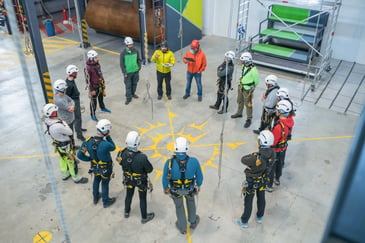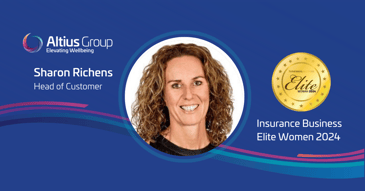Altius Group’s National NDIS Services Manager, Andy Bennett, outlines the eight key features of the best NDIS providers and runs through important considerations to factor in.
The best NDIS providers incorporate these key features into their service delivery:
1. A Focus on Everyday Life
- They support the participant to take part in daily life at home and in the community.
- They understand that supporting the participant in their daily life can help them to feel they belong and can give them the opportunities to learn and practise new skills.
- They ensure the participant and their family have full choice and control about the services they request and receive
2. Qualified Professionals Employ Evidence-Based Strategies
- They employ professionals with appropriate expertise, experience and qualifications.
- They incorporate strategies that are grounded in research and clinical evidence.
- They measure themselves against the National Guidelines of the NDIS Commission.
3. Focussed on Outcomes
- They focus on outcomes that the participant wants (and those of their family).
- They identify the skills the participant and their support team need to achieve these outcomes.
4. Focussed on Education to Empower Individuals
- They work to develop the knowledge, skills and abilities of the people who spend the most time with the participant. This enables them to have the biggest possible impact on the participant’s growth and development.
5. Creating a Participant-focused Team including Family and Carers
- They work in partnership with the participant, their family, carers and other stakeholders.
- They provide interventions for the participant that consider family priorities and the home situation.
- They build on the participant’s and family/carer’s strengths to support them to develop their support networks.
6. Inclusive
- They recognise that every participant has the right to take part in family and community life and to have the same choices, opportunities and experiences as others, understanding everyone’s need have a real sense of belonging.
7. Focussed on Teamwork
- They work as part of a team that includes the participant and all stakeholders.
- They share information, knowledge and skills with the participant and their nominated representative.
- They allocate the participant one main person to work with throughout the service, to maintain clear and consistent communication.
8. Culturally Sensitive
- They understand and respect diversity, welcoming everyone regardless of their cultural, language or religious backgrounds or family beliefs, and incorporate any cultural needs or beliefs into programs.
Additional Considerations
1. Does the provider understand the NDIS, and what can they do to help you navigate the NDIS process?
The NDIS is a big change for everybody, and some service providers have a better understanding of it than others. Choose a service provider who has extensive information on NDIS and who is responsive to your questions. Some providers may also be able to meet with you to help you prepare for your NDIS planning meeting, so you can get the best out of your meeting.
2. Are the Service Agreements easy to understand?
A Service Agreement is a document that helps explain how the service provider will support you to use the supports in your NDIS plan. If your service provider gives you an easy to understand Service Agreement, this will help you to understand:
- what supports will be provided, what they cost, and how they will be paid for
- any agreed terms and conditions.
3. Does the provider specialise in disability support?
Not all NDIS providers specialise in disability services for children and adults, and their families and carers, and some providers can only deliver certain types of support. You can choose to receive all your supports through the one service provider, or you can use different service providers for each support. You will just need a Service Agreement for each provider you choose. Whatever you choose to do, make sure you’re confident that the providers you choose understand your needs.
4. Can they tailor their supports to help you meet your goals?
Ideally, you want to choose a service provider who can tailor their supports to your specific needs, who will listen to you and understand your goals, and will work with you to help you achieve those goals.
5. Do they have a strong commitment, and policies, to ensure quality and safeguards?
If the service provider is a registered NDIS provider, this means they have signed up to the NDIS terms of business and the national quality and safeguards.
Note: You can only select providers who are not NDIS registered if you are self-managing your plan. If you do choose a non-NDIS registered provider, make sure you are satisfied that they can offer you an appropriate level of quality and safeguards. NDIS registered providers also have to comply with a number of laws, guidelines, policies and service standards, which non-registered providers may not comply with.
Practical Considerations:
When choosing an NDIS service provider, it’s important to look for those providers that meet the specific needs of the participant. To do this, ask practical questions about their service provision, think about accessibility, and meet your providers face to face if you can.
For Service Provision ask questions like:
- How will you work with me to support my development?
- What qualifications and experience do the professionals in your organisation have?
- Where will the participant get the support – e.g. at home, at school, day facilities, group programs, etc?
- How much flexibility is there? How much choice will the participant have about what to use within the service?
- What support can you give the participant when they transition to a new life stage e.g. will you come to school or employer meetings to facilitate changes in the participant’s environment and hence their needs?
- How will you support the mainstream or community activities that the participant might be involved with – e.g. sports clubs?
- How long will the participant have to wait before the support can start?
- What can the participant do if they are unhappy with the support the provider is providing?
For Accessibility consider questions like:
- Can the participant get to the service easily? E.g., can they get there by public transport, or is there a car park nearby?
- Alternately, will the provider come to the participant
- When and how often will the participant need the service?
Meet the provider face to face. Consider:
- How comfortable are you with the provider?
- Are they focussed on you and your needs?
- Are they the right ‘fit’ for you?
Explore Altius Group NDIS Services here.






